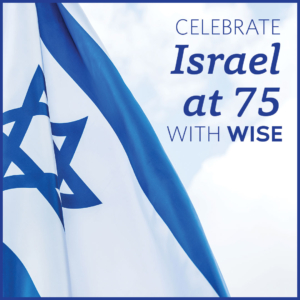This week, different members of our clergy will share thoughts about Israel. Today Rabbi Ron Stern writes on the “Israeli High Holidays”: Yom HaShoah, Yom HaZikaron, and Yom HaAtzmaut.
Looking in the rearview mirror (or the backup camera to be more contemporary) at the Israeli High Holidays—as we call the series of observances that begins with Yom HaShoah (Holocaust Remembrance Day), continues with Yom HaZikaron (Israel’s memorial day), and ends with Yom HaAtzmaut (Israeli Independence Day)—we are reminded of the unique nature of the Jewish people.
 We are a religious group with a national identity. Founded on the soil of Israel, much of Jewish identity is linked to the land and the history of our people on that land. We are a cultural group that has a unique language and common calendar that remains distinct even though we find ourselves dwelling in a myriad of lands. Often, the trappings of those cultures are integrated into Jewish self-identity. Hence, we have American Jews, Persian Jews, Russian Jews, German Jews, and even Israeli Jews. Our Jewishness is maintained even as aspects of those cultures reshape the expression of that Jewishness.
We are a religious group with a national identity. Founded on the soil of Israel, much of Jewish identity is linked to the land and the history of our people on that land. We are a cultural group that has a unique language and common calendar that remains distinct even though we find ourselves dwelling in a myriad of lands. Often, the trappings of those cultures are integrated into Jewish self-identity. Hence, we have American Jews, Persian Jews, Russian Jews, German Jews, and even Israeli Jews. Our Jewishness is maintained even as aspects of those cultures reshape the expression of that Jewishness.
The expressions of our religious diversity, whether it be secular, Reform, Conservative, Orthodox, or Chabad, may result in internal strife and contention, but we still see ourselves as sharing a common story and foundational identity.
My secular Israeli brother-in-law recently lost his mother, Sally. We spoke during shiva as he sat in Tel Aviv with their friends and family. I was struck by the way the complex identity that is Judaism came together as they mourned their 91 year old, Romanian, Holocaust survivor matriarch. Sally’s sons both served in the Israeli army. One lives in Israel, the other made his life (with my sister) in the US. One of her beloved grandsons is an Israeli citizen and an activist peacenik. All gathered at her funeral, officiated by an Orthodox rabbi. In his eulogy, my brother-in-law incorporated the phrase “Ribono shel Olam”—Master of the Universe, a classic reference to God in as he described his classic Jewish mother who wouldn’t let him leave the house without a sweater … in Tel Aviv … in the summer. The ancient reference to God was both reminiscent of Jewish custom and intended by him to be a slightly humorous invocation. During our call, he spoke to me about the wisdom of Jewish mourning and how much comfort it gave his family. This from someone who is far from being a regular synagogue-goer.
So, Jews around the world mourn the atrocities committed against mostly Ashkenazi Jews. Jews who are citizens of nations everywhere celebrate the nationhood of Israel. Regardless of observance or origins, most Jews observe some Jewish ritual practices, certainly for life events and even many holidays in ways that are universally recognizable to all of us. It is this truly unique quality of Jewish identity that has re-birthed the Jewish nation and secured the survival of the Jewish people in whatever land we call home.
—Rabbi Ron Stern
